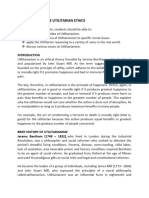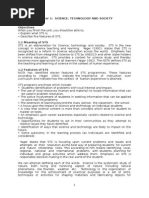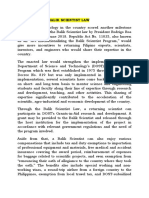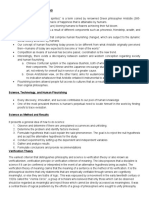0%(1)0% found this document useful (1 vote)
984 viewsModule 4 The Good Life
This document discusses different schools of thought on what constitutes the "good life". It describes Aristotle's view that happiness is the ultimate goal and end of life. It then outlines several other perspectives: materialism sees material possessions as the source of happiness; hedonism believes pleasure-seeking is the priority; stoicism argues one must learn detachment and apathy; theism sees communion with God as the basis of happiness; and humanism posits that humans can determine their own destiny free from religious dictates. Overall, the document analyzes how different philosophies and worldviews approach defining and achieving the good life.
Uploaded by
Almer CabidaCopyright
© © All Rights Reserved
Available Formats
Download as PPTX, PDF, TXT or read online on Scribd
0%(1)0% found this document useful (1 vote)
984 viewsModule 4 The Good Life
This document discusses different schools of thought on what constitutes the "good life". It describes Aristotle's view that happiness is the ultimate goal and end of life. It then outlines several other perspectives: materialism sees material possessions as the source of happiness; hedonism believes pleasure-seeking is the priority; stoicism argues one must learn detachment and apathy; theism sees communion with God as the basis of happiness; and humanism posits that humans can determine their own destiny free from religious dictates. Overall, the document analyzes how different philosophies and worldviews approach defining and achieving the good life.
Uploaded by
Almer CabidaCopyright
© © All Rights Reserved
Available Formats
Download as PPTX, PDF, TXT or read online on Scribd
You are on page 1/ 17
MODULE 4 :The Good Life
What is Good Life as Perceived by different schools of
thought?
Aristotle and Good Life
It is interesting to note that the first philosopher who
approached the problem of reality from scientific lens is
Aristotle who is also the first thinker who dabbled into the
complex problematization of the end goal of life: happiness.
Compared to his predecessor and teacher, Plato, Aristotle
embarked on different approach in figuring out reality. Plato
thought that things in this world are not real and are only
copies of the real in the world of forms. While Aristotle puts
everything back to the ground in claiming that this world is
all there and that this world is the only reality, we can all
access.
Aristotle also forwarded the idea that there is no reality over
and above what the senses can perceive. As such, it is only
by observation of the external world that one can truly
understand what reality is all about. Change is a process
that is inherent in things. We, along with all other entities in
the world start as potentialities and move towards
actualities. The movement, of course, entails change.
Look at the seed in the picture. It eventually germinates and
grows into a plant. The seed that turned to become the
plant underwent change from the potential plant that is the
seed to its full actuality.
This can be likened to what Aristotle says that every human
person aspires for an end. This end is happiness or human
flourishing. And no one resists happiness because we all
want to be happy.
Materialism
In terms of human flourishing, matter is what makes us
attain happiness. The material things we possess give us
ultimate happiness. We see this at work with most people
who are clinging on to material wealth as the primary
source of meaning of their existence.
Hedonism
The Hedonists see the end goal of life in acquiring pleasure.
Pleasure has always been the priority of hedonists. For
them life is obtaining and indulging in pleasure because life
is limited. They believe that pleasure give meaning to their
life without thinking of the future. The mantra of this school
of thought is the famous, “Eat, drink and merry for tomorrow
we will die.
Stoicism
Another school of thought led by Epicurus, the stoics,
exposed the idea that to generate happiness, one must
learn to distance oneself and be apathetic. The original term
apatheia, precisely means to be indifferent. These group
believe that they can do things at their own and believe that
happiness can only be attained by a careful practice of
apathy.
Theism
Most people find the meaning of their lives using God as the
fulcrum of their existence. The Philippines, as
predominantly country, is witness to how people base their
life goals on beliefs that hinged on some form of
supernatural reality called heaven. The ultimate basis of
happiness for theists is the communion with God
Humanism
Humanism as another school of thought espouses the
freedom of man to carve his own destiny and to legislate his
own laws, free from the shackles of a God that monitors
and controls. For humanists, man is literally the captain of
his own ship. They see themselves not merely as stewards
of the creation but as individuals who are in control of
themselves and the world outside them.
As a result of the motivation of the humanist current,
scientists eventually turned to technology in order to ease
the difficulty of life. Scientists of today meanwhile are ready
to confront more sophisticated attempts at altering the world
for the benefit of humanity. Some people now are willing to
tamper with time and space in the name of technology.
You might also like
- Science, Technology and Society: (MIDTERM Lesson 1-5)100% (1)Science, Technology and Society: (MIDTERM Lesson 1-5)4 pages
- 2 General Concepts and Historical Developments100% (1)2 General Concepts and Historical Developments3 pages
- Benjamin Wiker (Author), William A. Dembski (Forward) - Moral Darwinism - How We Became Hedonists-IVP (2002) PDF100% (2)Benjamin Wiker (Author), William A. Dembski (Forward) - Moral Darwinism - How We Became Hedonists-IVP (2002) PDF264 pages
- Martin Krampen - Children's Drawings - Iconic Coding of The Environment100% (1)Martin Krampen - Children's Drawings - Iconic Coding of The Environment239 pages
- Module 6: The Nano World and Gene Therapy: Climate Change & The Energy Crisis Environmental AwarenessNo ratings yetModule 6: The Nano World and Gene Therapy: Climate Change & The Energy Crisis Environmental Awareness59 pages
- Module in NSCI 110: Science, Technology and Society: Prof. Richelle O. Tuvillo Dr. Larry D. Buban0% (1)Module in NSCI 110: Science, Technology and Society: Prof. Richelle O. Tuvillo Dr. Larry D. Buban74 pages
- The Good Life According To Aristotle and Other PhilosophiesNo ratings yetThe Good Life According To Aristotle and Other Philosophies37 pages
- Techně Logos: Law Formulated by Isaac Asimov Back in 1940'sNo ratings yetTechně Logos: Law Formulated by Isaac Asimov Back in 1940's8 pages
- Serafica - Chapter 1 Lesson 1 Intellectual Revolutions That Defined Society100% (1)Serafica - Chapter 1 Lesson 1 Intellectual Revolutions That Defined Society22 pages
- Historical Antecedents in The Course of Science and TechnologyNo ratings yetHistorical Antecedents in The Course of Science and Technology2 pages
- Moral Self: Living With Purpose-Personal Value and in Philosophy in LifeNo ratings yetMoral Self: Living With Purpose-Personal Value and in Philosophy in Life11 pages
- 1-Introduction To Science, Technology, and SocietyNo ratings yet1-Introduction To Science, Technology, and Society3 pages
- 5.human Flourishing As Reflected in Progress and Development67% (3)5.human Flourishing As Reflected in Progress and Development5 pages
- GE 9ED The Life and Works of Rizal MidtermNo ratings yetGE 9ED The Life and Works of Rizal Midterm40 pages
- STS Instructional Modules Midterm CoverageNo ratings yetSTS Instructional Modules Midterm Coverage58 pages
- St. Vincent College of Cabuyao Mamatid, Cabuyao Laguna College Department Activity in Science, Technology and SocietyNo ratings yetSt. Vincent College of Cabuyao Mamatid, Cabuyao Laguna College Department Activity in Science, Technology and Society4 pages
- Romans and Chinese Civilization STS Reporting PDFNo ratings yetRomans and Chinese Civilization STS Reporting PDF16 pages
- Martin Heidegger's The Question Concerning Technology100% (1)Martin Heidegger's The Question Concerning Technology2 pages
- Science, Technology and Society: (MIDTERM Lesson 1-5)67% (3)Science, Technology and Society: (MIDTERM Lesson 1-5)6 pages
- General Concept and Historical Development of Science and TechnologyNo ratings yetGeneral Concept and Historical Development of Science and Technology14 pages
- Science, Technology and Nation BuildingNo ratings yetScience, Technology and Nation Building54 pages
- Chapter 6 and 7: The Human Person Flourishing in Terms of Science and TechnologyNo ratings yetChapter 6 and 7: The Human Person Flourishing in Terms of Science and Technology10 pages
- Why Is It Important To Study The History of Science and Technology100% (1)Why Is It Important To Study The History of Science and Technology1 page
- GE STS - Human Flourishing As Reflected in Progress and Development100% (2)GE STS - Human Flourishing As Reflected in Progress and Development11 pages
- The Nano World: Republic of The Philippines Nabua, Camarines SurNo ratings yetThe Nano World: Republic of The Philippines Nabua, Camarines Sur4 pages
- Human Flourishing in Science and TechnologyNo ratings yetHuman Flourishing in Science and Technology6 pages
- Science and Technology and Nation BuildingNo ratings yetScience and Technology and Nation Building4 pages
- The Impact of a Deadly Pandemic on Individual, Society, Economy and the WorldFrom EverandThe Impact of a Deadly Pandemic on Individual, Society, Economy and the WorldNo ratings yet
- Science and Technology and Nation BuildingNo ratings yetScience and Technology and Nation Building27 pages
- Science, Technology and Society Module 1.1No ratings yetScience, Technology and Society Module 1.118 pages
- Science, Technology and Society Module 1.2No ratings yetScience, Technology and Society Module 1.213 pages
- Values, Ethics, and Advocacy LEARNING OUTCOMES After Completing This100% (3)Values, Ethics, and Advocacy LEARNING OUTCOMES After Completing This28 pages
- What Is The Relation Between Religion and Education100% (1)What Is The Relation Between Religion and Education3 pages
- Greek Philosophy, London Study Guide Biblio 2005No ratings yetGreek Philosophy, London Study Guide Biblio 200524 pages
- Archaeology's Humanism and The Materiality of The Body-Julian ThomasNo ratings yetArchaeology's Humanism and The Materiality of The Body-Julian Thomas2 pages
- Manifestation of Cosmic Hierarchies in The Shi'i and Christian TraditionsNo ratings yetManifestation of Cosmic Hierarchies in The Shi'i and Christian Traditions13 pages
- Ethos, Pathos, or Logos?: What Appeal Are Advertisers Using To Get You To Buy Their Product?No ratings yetEthos, Pathos, or Logos?: What Appeal Are Advertisers Using To Get You To Buy Their Product?23 pages
- Transhumanism and Posthumanism: Internet ResourcesNo ratings yetTranshumanism and Posthumanism: Internet Resources4 pages
- Thom Brooks - Hegel's Political Philosophy PDF100% (2)Thom Brooks - Hegel's Political Philosophy PDF225 pages
- Glaveanu Principles Cultural Psychology of Creativity 2010No ratings yetGlaveanu Principles Cultural Psychology of Creativity 201017 pages
- Science, Technology and Society: (MIDTERM Lesson 1-5)Science, Technology and Society: (MIDTERM Lesson 1-5)
- Benjamin Wiker (Author), William A. Dembski (Forward) - Moral Darwinism - How We Became Hedonists-IVP (2002) PDFBenjamin Wiker (Author), William A. Dembski (Forward) - Moral Darwinism - How We Became Hedonists-IVP (2002) PDF
- Martin Krampen - Children's Drawings - Iconic Coding of The EnvironmentMartin Krampen - Children's Drawings - Iconic Coding of The Environment
- Module 6: The Nano World and Gene Therapy: Climate Change & The Energy Crisis Environmental AwarenessModule 6: The Nano World and Gene Therapy: Climate Change & The Energy Crisis Environmental Awareness
- Module in NSCI 110: Science, Technology and Society: Prof. Richelle O. Tuvillo Dr. Larry D. BubanModule in NSCI 110: Science, Technology and Society: Prof. Richelle O. Tuvillo Dr. Larry D. Buban
- The Good Life According To Aristotle and Other PhilosophiesThe Good Life According To Aristotle and Other Philosophies
- Techně Logos: Law Formulated by Isaac Asimov Back in 1940'sTechně Logos: Law Formulated by Isaac Asimov Back in 1940's
- Serafica - Chapter 1 Lesson 1 Intellectual Revolutions That Defined SocietySerafica - Chapter 1 Lesson 1 Intellectual Revolutions That Defined Society
- Historical Antecedents in The Course of Science and TechnologyHistorical Antecedents in The Course of Science and Technology
- Moral Self: Living With Purpose-Personal Value and in Philosophy in LifeMoral Self: Living With Purpose-Personal Value and in Philosophy in Life
- 1-Introduction To Science, Technology, and Society1-Introduction To Science, Technology, and Society
- 5.human Flourishing As Reflected in Progress and Development5.human Flourishing As Reflected in Progress and Development
- St. Vincent College of Cabuyao Mamatid, Cabuyao Laguna College Department Activity in Science, Technology and SocietySt. Vincent College of Cabuyao Mamatid, Cabuyao Laguna College Department Activity in Science, Technology and Society
- Martin Heidegger's The Question Concerning TechnologyMartin Heidegger's The Question Concerning Technology
- Science, Technology and Society: (MIDTERM Lesson 1-5)Science, Technology and Society: (MIDTERM Lesson 1-5)
- General Concept and Historical Development of Science and TechnologyGeneral Concept and Historical Development of Science and Technology
- Chapter 6 and 7: The Human Person Flourishing in Terms of Science and TechnologyChapter 6 and 7: The Human Person Flourishing in Terms of Science and Technology
- Why Is It Important To Study The History of Science and TechnologyWhy Is It Important To Study The History of Science and Technology
- GE STS - Human Flourishing As Reflected in Progress and DevelopmentGE STS - Human Flourishing As Reflected in Progress and Development
- The Nano World: Republic of The Philippines Nabua, Camarines SurThe Nano World: Republic of The Philippines Nabua, Camarines Sur
- The Impact of a Deadly Pandemic on Individual, Society, Economy and the WorldFrom EverandThe Impact of a Deadly Pandemic on Individual, Society, Economy and the World
- Values, Ethics, and Advocacy LEARNING OUTCOMES After Completing ThisValues, Ethics, and Advocacy LEARNING OUTCOMES After Completing This
- What Is The Relation Between Religion and EducationWhat Is The Relation Between Religion and Education
- Archaeology's Humanism and The Materiality of The Body-Julian ThomasArchaeology's Humanism and The Materiality of The Body-Julian Thomas
- Manifestation of Cosmic Hierarchies in The Shi'i and Christian TraditionsManifestation of Cosmic Hierarchies in The Shi'i and Christian Traditions
- Ethos, Pathos, or Logos?: What Appeal Are Advertisers Using To Get You To Buy Their Product?Ethos, Pathos, or Logos?: What Appeal Are Advertisers Using To Get You To Buy Their Product?
- Transhumanism and Posthumanism: Internet ResourcesTranshumanism and Posthumanism: Internet Resources
- Glaveanu Principles Cultural Psychology of Creativity 2010Glaveanu Principles Cultural Psychology of Creativity 2010





























































































